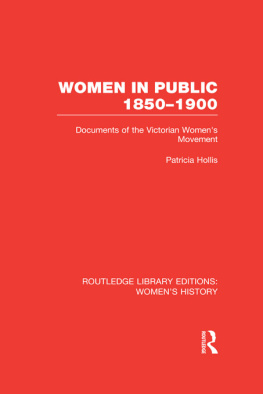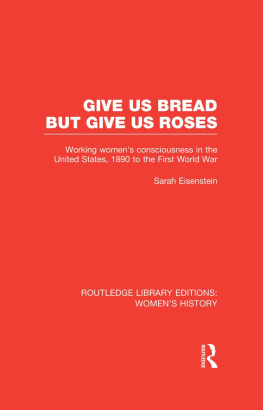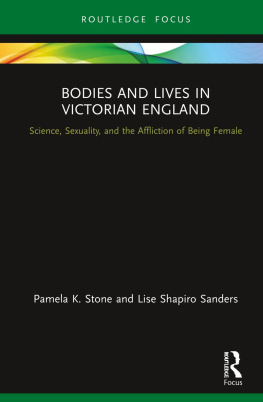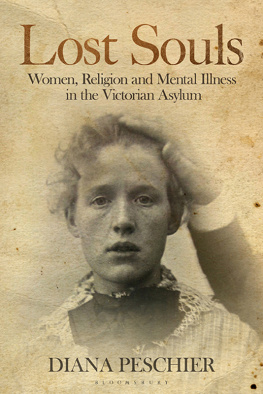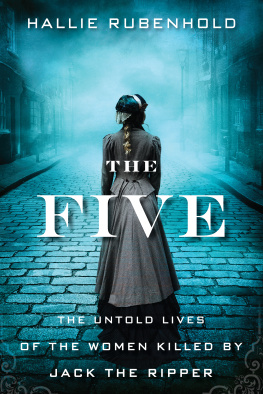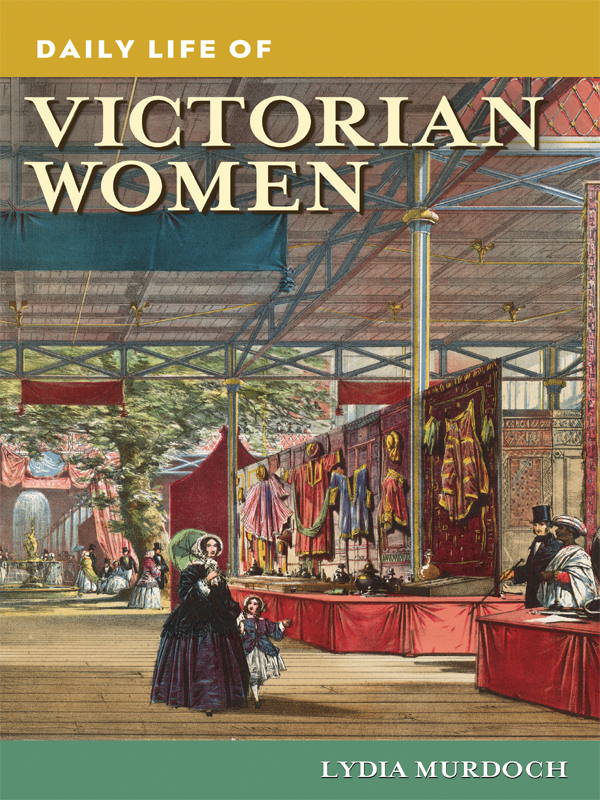
DAILY LIFE OF
VICTORIAN
WOMEN
Recent Titles in
The Greenwood Press Daily Life Through History Series
Women during the Civil Rights Era
Danelle Moon
Colonial Latin America
Ann Jefferson and Paul Lokken
The Ottoman Empire
Mehrdad Kia
Pirates
David F. Marley
Arab Americans in the 21st Century
Anan Ameri and Holly Arida, Editors
African American Migrations
Kimberley L. Phillips
The Salem Witch Trials
K. David Goss
Behind the Iron Curtain
Jim Willis
Trade: Buying and Selling in World History
James M. Anderson
The Colonial South
John Schlotterbeck
A Medieval Monastery
Sherri Olson
Arthurian Britain
Deborah J. Shepherd
DAILY LIFE OF
VICTORIAN
WOMEN
LYDIA MURDOCH
The Greenwood Press Daily Life Through History Series

AN IMPRINT OF ABC-CLIO, LLC
Santa Barbara, California Denver, Colorado Oxford, England
Copyright 2014 by ABC-CLIO, LLC
All rights reserved. No part of this publication may be reproduced, stored in a retrieval system, or transmitted, in any form or by any means, electronic, mechanical, photocopying, recording, or otherwise, except for the inclusion of brief quotations in a review, without prior permission in writing from the publisher.
Library of Congress Cataloging-in-Publication Data
Murdoch, Lydia, 1970
Daily life of Victorian women / Lydia Murdoch.
pages cm. (The Greenwood Press daily life through history series)
Includes index.
ISBN 978-0-313-38498-1 (hardback) ISBN 978-0-313-38499-8 (ebook)
1. WomenGreat BritainHistory19th century. 2. WomenGreat BritainSocial conditions. 3. Womens rightsGreat Britain. 4. Great BritainSocial conditions19th century. 5. Sex roleGreat BritainHistory19th century. I. Title.
HQ1596.M87 2013
305.40941dc23 2013020956
ISBN: 978-0-313-38498-1
EISBN: 978-0-313-38499-8
18 17 16 15 14 1 2 3 4 5
This book is also available on the World Wide Web as an eBook.
Visit www.abc-clio.com for details.
Greenwood
An Imprint of ABC-CLIO, LLC
ABC-CLIO, LLC
130 Cremona Drive, P.O. Box 1911
Santa Barbara, California 93116-1911
This book is printed on acid-free paper 
Manufactured in the United States of America
For M. Jeanne Peterson
CONTENTS
ACKNOWLEDGMENTS
I am grateful to my Vassar colleagues, especially to those in History, Urban Studies, Victorian Studies, and Womens Studies. Vassar librarians Deb Bucher and Carol Lynn Marshall answered my many questions, and Barbara Durniak and the interlibrary loan staff found obscure materials. Lee Bernstein, Lisa Brawley, Mita Choudhury, Lisa Collins, Beth Darlington, Rebecca Edwards, Andy Fiss, Laura Kasson Fiss, Kit French, Susan Hiner, Seth Koven, Ellen Ross, Mary Shanley, Anthony Wohl, and Susan Zlotnick offered support and shared their expertise with me. Along with the works of other scholars listed in the Further Reading, the books by Sally Mitchell, Ellen Ross, and Susie Steinbach provided invaluable models for how to write a history of Victorian womens daily life. The VICTORIA Listserv, run by Patrick Leary, has also been a vital resource. I am also thankful to my editors: Bridget Austiguy-Preschel, Denver Compton, Nina Gomez, Sharmila Krishnamurthy, and T. Malarvizhi. My greatest thanks go to my student research assistants Alexandra Zeman, Laura McCoy, and Andrea Selby, and to Andy Evans and Carol Engelhardt Herringer, who generously provided insightful suggestions on the entire manuscript.
This book is dedicated with gratitude to M. Jeanne Peterson, professor emeritus of History and Gender Studies at Indiana University, whose own research and teaching have done so much to advance the field of Victorian womens social history.
CHRONOLOGY
| 1828 | Repeal of Test and Corporation Acts grants Nonconformists right to hold public office and serve in parliament |
| 1829 | Catholic Emancipation grants Catholics right to serve in parliament |
| 1830 | Liverpool and Manchester Railway opens |
| 1831 | Mary Prince, The History of Mary Prince, a West Indian Slave |
| 18311832 | Cholera epidemic |
| 1832 | Great Reform Act enfranchises middle-class men |
| 1833 | Factory Act limits childrens work hours |
| 1833 | Emancipation Act outlaws slavery in British colonies followed by the apprenticeship system in West Indian colonies until 1838 |
| 1834 | New Poor Law |
| 1837 | King William IV dies and Victoria becomes queen |
| 1838 | Anti-Corn Law League |
| 1838 | 700,000 women petition Queen Victoria to end apprenticeship system in British West Indian colonies demonstrating how petitioning becomes an important political tool for women in the 1830s |
| 18391840 | Louis Daguerre refines daguerreotype photographic process in France and William Fox Talbot develops calotype process in England |
| 1839 | Sarah Stickney Ellis, The Women of England: Their Social Duties and Domestic Habits |
| 1839 | Custody of Infants Act |
| 1839 | First Chartist petition presented to parliament |
| 18391842 | First Opium War |
| 1840 | Uniform Penny Post |
| 1840 | Marriage of Queen Victoria and Prince Albert |
| 1840 | British Foreign Anti-Slavery Society holds first World Anti-Slavery Convention in London |
| 1842 | Second Chartist petition presented to parliament |
| 1842 | Mines and Collieries Act limits employment of women and children |
| 1842 | London Female Chartist Association |
| 1844 | Factory Act restricts hours of women and sets additional limits on children |
| 1845 | Friedrich Engels, The Condition of the Working Class in England |
| 18451854 | Irish Potato Famine |
| 1846 | Repeal of the Corn Laws signals support for free trade and Prime Minister Sir Robert Peel resigns, dividing Tory Party |
| 1847 | Factory Act (Ten Hour Act) reduces workday to 10 hours for women and children under 18 in textile mills |
| 1848 | Third Chartist petition presented to parliament |
| 1848 | Pre-Raphaelite Brotherhood |
| 18481849 | Cholera epidemic |
| 1849 | Bedford College for Women, London |
| 1851 | Sheffield Womens Political Association |
| 1851 | Religious census raises concern about declining church attendance and national census sparks debate about increasing numbers of unmarried superfluous women |
| 1851 | Great Exhibition at the Crystal Palace |
| 1851 | Harriet Taylor, Enfranchisement of Women, Westminster Review |
| 18521871 | Englishwomans Domestic Magazine |
| 1852 | 500,000 Englishwomen sign petition to end slavery in the United States |
| 1853 | Doctors give Queen Victoria chloroform for the birth of her eighth child |
Next page

